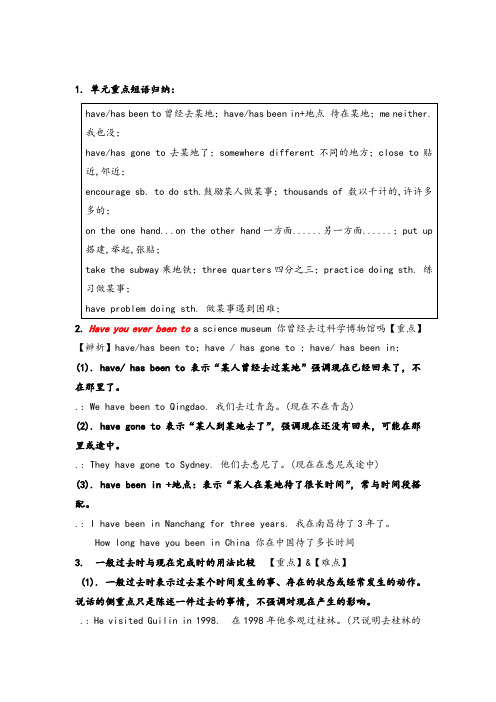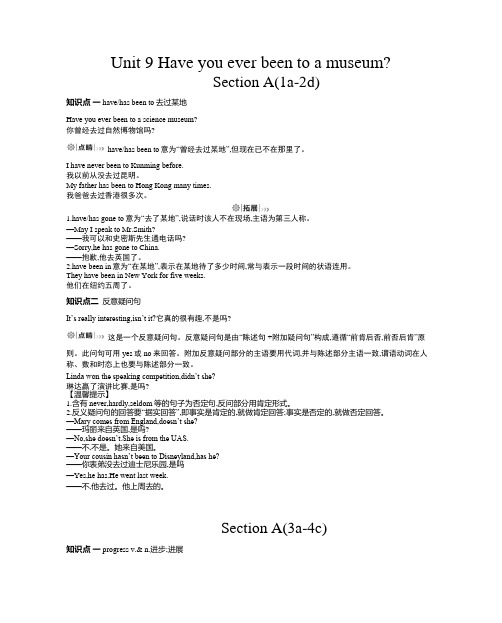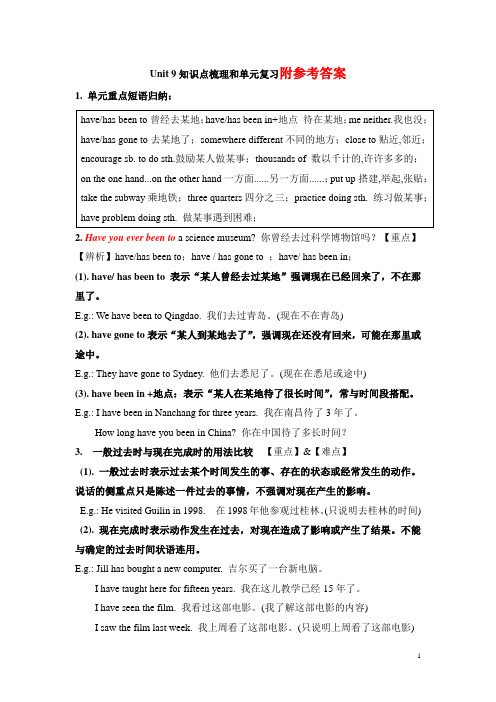八年级英语下册Unit9HaveyoueverbeentoamuseumPeriod3导学案(无答案)(新版)人教新目标版
unit9haveyoueverbeentoamuseum知识点梳理及单元复习

1. 单元重点短语归纳:2. Have you ever been to a science museum 你曾经去过科学博物馆吗【重点】【辨析】have/has been to;have / has gone to ;have/ has been in;(1). have/ has been to 表示“某人曾经去过某地”强调现在已经回来了,不在那里了。
.: We have been to Qingdao. 我们去过青岛。
(现在不在青岛)(2). have gone to表示“某人到某地去了”,强调现在还没有回来,可能在那里或途中。
.: They have gone to Sydney. 他们去悉尼了。
(现在在悉尼或途中)(3). have been in +地点:表示“某人在某地待了很长时间”,常与时间段搭配。
.: I have been in Nanchang for three years. 我在南昌待了3年了。
How long have you been in China 你在中国待了多长时间3. 一般过去时与现在完成时的用法比较【重点】&【难点】(1). 一般过去时表示过去某个时间发生的事、存在的状态或经常发生的动作。
说话的侧重点只是陈述一件过去的事情,不强调对现在产生的影响。
.: He visited Guilin in 1998. 在1998年他参观过桂林。
(只说明去桂林的时间)(2). 现在完成时表示动作发生在过去,对现在造成了影响或产生了结果。
不能与确定的过去时间状语连用。
.: Jill has bought a new computer. 吉尔买了一台新电脑。
I have taught here for fifteen years. 我在这儿教学已经15年了。
I have seen the film. 我看过这部电影。
(我了解这部电影的内容)I saw the film last week. 我上周看了这部电影。
八年级英语下册Unit9Haveyoueverbeentoamuseum重点归纳笔记(带答案)

八年级英语下册Unit9Haveyoueverbeentoamuseum重点归纳笔记单选题1、—What a fine day! Let’s go for a picnic, ________?—Sounds like a good idea.A.shall weB.don’t weC.can we答案:A句意:——多好的天气啊!我们去野餐,好吗?——听起来是个好主意。
考查反意疑问句。
根据题干中“Let’s go for a picnic, ________?”可知反意疑问句的陈述部分是以let's开头的祈使句,疑问部分用shall we。
故选A。
2、—How do you improve your spoken English?—By practicing _____________ to my teachers and classmates.A.talkingB.to talkC.talk答案:A句意:——你如何提高你的英语口语的?——通过和老师和同学们练习交谈。
考查动词形式。
practice练习,根据practice doing“练习做某事”可知,故选A。
小提示:跟动名词做宾语的动词(词组):完成、实践、值得忙finish, practice, be worth, be busy继续、习惯、可放弃keep on, be used to, give up考虑、建议、不禁想consider, suggest, can’t help, feel like喜欢、思念、要介意enjoy, miss, mind3、—Mark, let’s go to the Center Museum together.—Good idea. There are many interesting things in November’s ________. A.exhibitionsB.inventionsC.instrumentsD.operations答案:A句意:——马克,我们一起去中心博物馆吧。
八年级英语下册 Unit 9 Have you ever been to a muse

单元语法聚焦九
( B ) 8.2017·重庆B John and I ________to visit his grandparents
last Sunday afternoon.
A.go
B.went
C.will go
D.have gone
【解析】考查动词的时态。根据句中的时间状语“last Sunday afternoon” 可知,用一般过去时态,故选B。
单元语法聚焦九
( B ) 5.2017·泰州 Neither Jim nor Tom _______ Australia before,
but they know the country very well.
A.has gone to
B.has been to
C.have gone to D.have beento, have gone to 与 have been in
1.have been to 表示“去过某地”,现在已经不在那个地方了。如: My uncle has been to Beijing twice. 我叔叔去过北京两次。 2.have gone to 表示“去某地了”,指现在到了某地或在去某地的 途中。如: The Greens have gone to Dalian for a holiday. 格林一家去大连度假了。
Unit 9 Have you ever been to a museum?
单元语法聚焦九
Unit 9 Have you ever been to a museum?
单元语法聚焦九
语法精 讲 语法精 练
单元语法聚焦九
语法精讲
一、含ever 和 never的句式
ever 和 never虽同为现在完成时的标志词,但用法不尽相同。 ever 意为“曾经”,表示肯定意思,可用于肯定句、否定句和疑问 句。never 意为“从不”,表示否定意思,常用来回答含有ever的一 般疑问句。
人教新目标版初中英语八年级下册Unit9Haveyoueverbeentoamuseum要点讲解

Unit 9 Have you ever been to a museum?Section A(1a-2d)知识点一have/has been to去过某地Have you ever been to a science museum?你曾经去过自然博物馆吗?have/has been to意为“曾经去过某地”,但现在已不在那里了。
I have never been to Kunming before.我以前从没去过昆明。
My father has been to Hong Kong many times.我爸爸去过香港很多次。
1.have/has gone to意为“去了某地”,说话时该人不在现场,主语为第三人称。
—May I speak to Mr.Smith?——我可以和史密斯先生通电话吗?—Sorry,he has gone to China.——抱歉,他去英国了。
2.have been in意为“在某地”,表示在某地待了多少时间,常与表示一段时间的状语连用。
They have been in New York for five weeks.他们在纽约五周了。
知识点二反意疑问句It’s really interesting,isn’t it?它真的很有趣,不是吗?这是一个反意疑问句。
反意疑问句是由“陈述句 +附加疑问句”构成,遵循“前肯后否,前否后肯”原则。
此问句可用yes或no来回答。
附加反意疑问部分的主语要用代词,并与陈述部分主语一致,谓语动词在人称、数和时态上也要与陈述部分一致。
Linda won the speaking competition,didn’t she?琳达赢了演讲比赛,是吗?【温馨提示】1.含有never,hardly,seldom等的句子为否定句,反问部分用肯定形式。
2.反义疑问句的回答要“据实回答”,即事实是肯定的,就做肯定回答;事实是否定的,就做否定回答。
—Mary comes from England,doesn’t she?——玛丽来自英国,是吗?—No,she doesn’t.She is from the UAS.——不,不是。
洛阳市八年级英语下册Unit9Haveyoueverbeentoamuseum知识点总结归纳完整版

洛阳市八年级英语下册Unit9Haveyoueverbeentoamuseum知识点总结归纳完整版单选题1、— ________ you ever ________ to Hong Kong?— Yes, only once.A.Did; goB.Have; goneC.Do; goD.Have; been答案:D句意:——你去过香港吗?——是的,只有一次。
考查时态。
根据答句“Yes, only once.”可知,问句表示“你曾去过香港吗?”表示“曾经去过某地”用“have/has ever been to+地点”。
故选D。
2、— May I speak to Mr. Black?— Sorry, he ______ Hong Kong. But he ______ in a few days.A.has been to; will comeB.has gone to; will comeC.has been to; cameD.has gone to; came答案:B句意:——我可以和布莱克先生说话吗?——对不起,他去香港了,但是几天后他会回来。
考查时态。
have gone to“去了某地”,说话时作句子主语的人不在现场;have been to“去过某地”,现在已不在那里了;由“Sorry”可知,布莱克先生不在现场,他去了香港,应使用has gone to,排除A/C;后句的时间状语是“in a few days”,是一般将来时的时间状语,所以后句应使用一般将来时will come,故选B。
3、We should not go outside, in such a terrible storm. A.probablyB.especiallyC.immediatelyD.exactly答案:B句意“我们不应该出去,特别是在这种恐怖的风暴的情况下”。
A.可能地;B.特别地(表示进一步强调);C.立刻地;D.正确地,精确地。
人教版八年级英语下册Unit9 Have you ever been to a museum知识点梳理及单元复习

Unit 9知识点梳理和单元复习附参考答案1. 单元重点短语归纳:have/has been to曾经去某地;have/has been in+地点待在某地;me neither.我也没;have/has gone to去某地了;somewhere different不同的地方;close to贴近,邻近;encourage sb. to do sth.鼓励某人做某事;thousands of 数以千计的,许许多多的;on the one hand...on the other hand一方面......另一方面......;put up搭建,举起,张贴;take the subway乘地铁;three quarters四分之三;practice doing sth. 练习做某事;have problem doing sth. 做某事遇到困难;2. Have you ever been to a science museum? 你曾经去过科学博物馆吗?【重点】【辨析】have/has been to;have / has gone to ;have/ has been in;(1). have/ has been to 表示“某人曾经去过某地”强调现在已经回来了,不在那里了。
E.g.: We have been to Qingdao. 我们去过青岛。
(现在不在青岛)(2). have gone to表示“某人到某地去了”,强调现在还没有回来,可能在那里或途中。
E.g.: They have gone to Sydney. 他们去悉尼了。
(现在在悉尼或途中)(3). have been in +地点:表示“某人在某地待了很长时间”,常与时间段搭配。
E.g.: I have been in Nanchang for three years. 我在南昌待了3年了。
How long have you been in China? 你在中国待了多长时间?3. 一般过去时与现在完成时的用法比较【重点】&【难点】(1). 一般过去时表示过去某个时间发生的事、存在的状态或经常发生的动作。
八年级下Unit-9-Have-you-ever-been-to-a-museum-(全单元知识点讲解及测试题)

Unit 9 Have you ever been to a museum?一、重点短语1.at night在夜晚2.in a more natural environment在一个更加自然的环境中3.all year round一年到头;终年4. be far from 离……远5. in the dark 在黑暗中6. in the past 在过去7. have been to sp. 去过某地8.science museum 科学博物馆9.history museum 历史博物馆10.amusement park 游乐园10.go somewhere different 去不同的地方11.go skating 去滑冰12.take the subway 坐地铁13.a great way to spend a Saturday afternoon一个过周六下午的好方法14.all the old movie cameras所有的古老的电影摄影机15.learn about sth.了解有关......的情况16.on the weekend 在周末17.camp in the mountains 在大山里露营18.put up a tent搭帐篷19.in such a rapid way 以如此迅猛的方式20.different kinds of各种各样的21.development of toilets 厕所的发展22.social groups 社会团体23.the tea art performances茶艺表演24.make a perfect cup of tea with beautiful tea sets用漂亮的茶具沏一杯完美的茶25.a nice place to enjoy tea 一个品茶的好地方26.thousands of 数以千计的27.International Museum of Toilets国际厕所博物馆28.the Terracotta Army 兵马俑29.Southeast Asia东南亚30.Night Safari 夜间动物园31three quarters 四分之三32.an English-speaking country一个讲英语的国家33.have problem doing sth. 做某事很困难34.during the daytime在白天35.a couple of times 好几次36.right now 现在;目前37.an amusement park with a special theme一个有特别的主题的游乐园38.walk around the park在公园里到处走39.hear of 听说40.take a ride兜风41.another province另一个省42.the Bird’s Nest鸟巢43.encourage sb. to do sth.鼓励某人做某事44.on the one hand... on the other hand.一方面,另一方面二、重点句型1. Have you ever been to... ?Have you ever been to a science museum? 你曾经去过科学博物馆吗?2. Let’s do sth 让我们一起去做某事吧Let’s go somewhere different today.我们今天去个不同的地方吧。
八年级英语下册Unit9Haveyoueverbeentoamuseum短语语法知识点汇总新版人教新目标版20180827464

Unit 9 Have you ever been to a museum一、必背短语1.一年到头;终年all year round2.离……远be far from3.在黑暗中in the dark4.在过去 in the past5.去过某地have been to sp.6. 游乐园amusement park7.搭帐篷put up a tent 8.在大山里露营camp in the mountains9.了解有关…的情况learn about sth. 10.以如此迅猛的方式in such a rapid way11.社会团体social groups 12.数以千计的thousands of13.四分之三three quarters 14.一个讲英语的国家an English-speaking country15.在白天during the daytime 16.好几次 a couple of times17. 现在;目前right now 18. 在公园里到处走walk around the park19.兜风take a ride 20.听说hear of22.遗留、留下leave behind21鼓励某人做某事encourage sb. to do sth.23.在某方面取得进步make progress in... 24.一方面on the one hand25.另一方面on the other hand【教材内容解析】Section A1. Me neither (P. 65)me neither意为“我也不……”,表示前者的否定情况也适用于我,反义词为me too。
---Susan can’t play the piano at all.---Me neither.2. Let’s go to one tomorrow. (P. 65)one是不定代词,用来代替前面出现过的可数名词单数,如果指代名词复数,用ones。
八年级英语下册Unit9Haveyoueverbeentoamuseum知识点总结归纳(带答案)

八年级英语下册Unit9Haveyoueverbeentoamuseum知识点总结归纳单选题1、—It’s unbelievable that 5G technology is progressing in such a rapid way!—____________ is impossible.A.SomethingB.AnythingC.NothingD.Everything答案:C句意:——难以置信5G技术发展如此迅速!——没什么是不可能的。
考查不定代词。
Something某些事物;Anything任何事物;Nothing没有什么;Everything所有,一切。
根据题干中“It’s unbelievable that 5G technology is progressing in such a rapid way!”讲5G技术发展如此迅速令人难以置信,可推出此处是说“没什么”是不可能的,用Nothing符合题意。
故选C。
2、We _______ Beijing many times, so we know it very well.A.have been inB.went toC.have been toD.have gone to答案:C句意:我们去过北京很多次,所以对北京很了解。
考查动词时态。
have been in在某地,表示状态;went to一般过去时态;have been to去过某地,已回来;have gone to去了某地,还未回来。
根据“We...Beijing many times, so we know it very well”可知,应该是去过某地,故选C。
3、David broke Lucy’s computer, but he managed to repair it by ________. A.itselfB.myselfC.herselfD.himself答案:D句意:他弄坏了露西的电脑,但他设法自己把它修好了。
八年级英语下册Unit9Haveyoueverbeentoamuseum单元语法知识梳理人教版

Unit 9 Have you ever been to a museum现在完成时(Ⅱ)1.现在完成时表示经历的用法现在完成时常用have been to(去过),ever(曾经),never(从没)等表示经历。
用法说明示例have / has been to表示去过某地,可以与never,ever,just,once等连用。
Mr. Smith has ever been to China three times.史密斯先生曾去过中国三次。
ever常用于现在完成时的一般疑问句中,放在主语之后,过去分词之前。
Have you ever visited the Palace Museum? 你曾参观过故宫博物馆吗?never表示否定,用在助动词have / has之后,过去分词之前。
表示否定的简短回答可以用neither。
—I have never been to Hong Kong.我从来没去过香港。
—Me neither.我也没去过。
2.have/ has been to与have / has gone to的用法区别用法说明示例have/ has been to意为“去过某地”,表示去过某地,现在已经回来了,通常与表示次数的状语连用,如twice,several times,ever,never等She has been to Europe twice.她去过欧洲两次。
(已经回来了)I have never been to the Great Wall.我从未去过长城。
have / has gone to意为“去了某地”,表示到某地去了,强调说话时去某地的人不在场(可能在途中,也可能已到达)。
—Where is Jim? 吉姆在哪里?—He has gone to England.他去英国了。
(现在不在这里)若have/ has been to或have / has gone to后接副词,则省略to。
八年级英语下册 Unit 9 Have you ever been to a museum(Pe

Period 5 Section B 2a — 2e
Warm–up and lead-in
T: Which country do you want to visit? Ss: … T: Why do you want to visit it? Ss: …
Pre-reading
fox
population
3. Read Para. 3 and fill in the blanks.
1. Singapore has a special zoo called __th_e__“_N_ig_h_t_S_a_f_a_ri_”___. 2. A lot of animals _w__ak_e__u_p_ at night, so this is_t_h_e_b_e_s_t_ti_m_e___ to watch them. 3. At the zoo, you can watch lions, tigers, and foxes in a _m__o_re__n_at_u_r_a_l _e_n_vi_r_o_n_m_e_n_t_ than _in_a__n_a_tu_r_a_l_z_o_o.
Welcome your coming!
Teacher’s best wishes
Homework
1. Read the article again after class. Try to describe Singapore. 2. Write an ad for your hometown or for a place you have been to. Include a few reasons why people should visit the place.
八年级英语下册Unit9_Have_you_ever_been_to_a_museum全单元精品课件

ppt精品课件
ppt精品课件
1. 在现在完成时中 ever, never, just, already, yet在用法和意思上 有什么区别?
现在完成时表示过去发生或完成的某一动作对现在造成的影 响或结果。 如:Have you read that story?你读过那个故事吗?(“读” 这一动作发生在过去,对现在造成的影响是:是否知道故事 的内容。) I have bought two apples. 我买了两个苹果。 (“买”这一 动作发生在过去,对现在造成的结果是:拥有两个苹果。)
ppt精品课件
Yes I’ve been to a science museum. / No, I’ve never been to a science museum.
Yes, I have. I went there last year./ No, I haven't.
I’ve been to the art museum many times.
ppt精品课件
(3). Have (has) been to 后面可接次数, 表示去过某地几次。 如:I've been to Beijing three times. 我去过北京三次。 They have been to that village several times. 他们去过那个村庄好几次了。 (4). Have (has) gone to 意为“到某地去了”,表示到了某地或正在去 某地的途中。总之,说话时该人不在现场,一般不用第一、二人称 代词作主语。 如: —Where is Tom? 汤姆在哪里? —He has gone to the bookshop. 他到书店去了。
- 1、下载文档前请自行甄别文档内容的完整性,平台不提供额外的编辑、内容补充、找答案等附加服务。
- 2、"仅部分预览"的文档,不可在线预览部分如存在完整性等问题,可反馈申请退款(可完整预览的文档不适用该条件!)。
- 3、如文档侵犯您的权益,请联系客服反馈,我们会尽快为您处理(人工客服工作时间:9:00-18:30)。
Unit 9. Have you ever been to a museum?
Period3 SectionB1a-1d
【学习目标】
知识与技能
(1)熟练掌握下列词汇:
hear, try, see, visit,couple, German, theme, ride, province
(2)熟练掌握下列短语:
the Terracotta Army, the Great Wall, the Bird’s Nest, the Palace Museum,a couple of, so many, with a special theme
(3)掌握下列句型:
Have you ever heard of …?
Have you been to another province in China?
Have you visited …?
Have you seen …?
Have you tried …?
When did you start studying English?
How long have you been studying English?
过程与方法
听力练习,小组问答练习
情感、态度与价值观
培养学生爱祖国,爱生活,以祖国为骄傲的情感。
【教学重难点】
重点:
1.谈论过去的经历
2. 能够熟练运用现在完成时态
难点:
现在完成时态的正确使用及动词的过去分词的正确表达
【导学过程】
一.新课预习
通过预习会读这些景点名称,熟读1b的句子并且理解。
二. 情景导入
T:Have you ever been to …?
Show the pictures of the four interesting places in China and have Ss match each picture with the correct name.
导入景点名称the Terracotta Army,the Great Wall,the Bird’s Nest,the Palace Museum,通过图片让学生学习景点的英文表达。
了解景点名称,为后面的听力扫除障碍。
三.合作探究
1.Work on 1b&1c)
(1)T: A student is interviewing a foreign student who has been to China. Please listen and check the questions you hear.(1b)
(2)T: Listen again and take notes. (1c)
Have Ss read the headings given in the note sheet and ask them to predict what kind of information they should put in for each heading.
第一遍听力,帮助学生进一步学习巩固学习现在完成时的一般疑问句,第二遍听力,让学生在听力中听出一些关键信息。
2. Post-listening (Work on 1d: Pair work)
T: Work in pairs. Imagine one of you is the foreign student who visited China and one of you is the interviewer.
Have Ss prepare some questions before they conduct their interview.
3.Review (Exercise)
Have Ss write the sentences/questions in English to review the sentences they have learned in this lesson.
四.点拨总结
.一般过去时,现在完成进行时和现在完成时的区别
一般过去时只表示_______________,和___________不发生联系。
现在完成时是用
_____________说明现在的情况。
He lived in Beijing in 2000. 只说明他2000年住在北京,他目前住在哪里并不清楚。
He has lived in Beijing since 2000. 说明他自从2000年就住在北京,他目前还住在北京。
